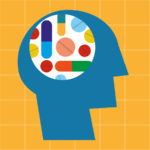By David Blyweiss, M.D., Advanced Natural Wellness
May 19, 2021
You probably already know that processed meat isn’t good for you. We’ve known for years and years that even a small amount on a regular basis is linked with a higher cancer risk, especially for the colon.
But did you know it can affect your chances of getting dementia? Over in the UK, they discovered that just 25 grams of processed meat a day is associated with a 44% increased risk of developing it. That’s somewhere around two slices of thin bacon.
So just imagine if you eat bacon, sausage or ham for breakfast each day. Add in a hot dog, submarine sandwich or pepperoni pizza on a regular basis and you could really push the limits on your brain function as you age.
I recommend limiting your intake of these kinds of processed meats. They’re just awful. They don’t do anything good for you.
Regular red meat is okay, as long as you don’t eat too much of it. Or the wrong kind. Go for grass-fed beef or lamb. If you eat pork, buy pastured.
Here’s another interesting food tidbit.
MD Exposes the Hidden Danger to Your Eyes

When your eyesight starts to fail, it's a real problem. Suddenly you can't go to the grocery store... you can't get to the doctor if you have an emergency... you can't meet your friends for dinner…
Your "regular" doctor doesn't have time to keep up with the latest research. And the same goes for eye doctors. They go to school to learn how to fit you for glasses and contacts, but have no way of preventing the damage and loss of eyesight that threatens your freedom and independence.
Let me show you something that explains a LOT about how your eyes work.
In my FREE Special Report, I'll show you a HUGE, untapped resource for your eyes that safely and naturally restores clear, effortless eyesight.
Click here to get started...
People 50 and older who don’t get enough flavonoids over the next two decades of their life are more inclined to develop Alzheimer’s or dementia. If you’re wondering what the heck flavonoids are, they’re the phytonutrients in fruits and vegetables that give them their bright, vivid color.
A low intake of apples, pears and teas doubles the risk. Not eating enough blueberries, strawberries and red wine increases the risk four-fold.
You’ll find the most powerful flavonoids in your red berries, purple berries and blue berries. When it comes to brightly colored produce, that’s where we’re getting most of our anthocyanins. Anything that has that deep, rich color. You can also find them in your wine and green tea.
And what about dark chocolate? It’s particularly rich in flavonoids. So if you like something sweet sometimes or want some chocolate, your best bet is to pick up some Ghirardelli dark chocolate raspberry squares. Pop them in the freezer and nibble on them every now and then. You’ll get the dark chocolate flavonoid and you’ll get the raspberry flavonoid.
Sleep Well, Move Frequently and Don’t Worry
Sometimes it’s not the foods you’re eating that add to your chances of mental decline. There are other variables you may not be aware of that can also affect your risk.
Not getting enough sleep. That’s one variable. If you’re not getting at least a solid seven hours a night, all of the damaging debris and oxidative stress you’ve accumulated in your brain during the day won’t get flushed out by your glymphatic system. This makes developing great sleep habits very important.
Lack of physical activity. That’s another one. When you get your muscles moving, your body makes something called brain derived neurotrophic factor (BDNF). People with higher BDNF levels are less likely to develop dementia and Alzheimer’s. The best way to boost your BDNF is to get up and get moving.
The World's Quickest Solution for Ending Prostate and Urinary Misery
This has recently been revealed to be one of the only real breakthroughs in prostate health.
The seeds of a strange fruit (sometimes called "Chinese Apples") hold powerful phytonutrients that are a revolution in prostate health.
In fact, UCLA and Veterans Administration research have now proved this to be true.
Not only that, but it may be the worlds quickest solution for ending prostate misery.
Simply stated, these phytonutrients represent a huge step beyond beta sitosterol, saw palmetto, and other phytosterols alone.
Simply click HERE if you want to have fast prostate relief...restful, uninterrupted sleep...no more constant "urges to go"...enhanced virility...and optimal prostate support for life.
Stress levels have an influence. Chronic stress makes you more susceptible to cognitive decline and dementia. So you have to find a way to handle it. You can find some great ideas here.
There’s one more thing I’d like to mention.
The Odd Thing About Antihistamines and Sleeping Pills
Some common, over-the counter medicines block the action of a chemical (acetylcholine) in your brain that’s necessary for memory and learning.
They’re called “anticholinergics”. These types of drugs are closely linked with higher levels of Alzheimer’s and dementia. And you probably don’t even think twice about taking them on a regular basis.
I’m talking about antihistamines like Benadryl and pills that help you sleep, including Sominex, Unisom, Excedrin PM, Tylenol PM and others.
Even heartburn meds like Tagamet and Zantac have weak anticholinergic activity. Plus some prescription bladder, antidepressant and antipsychotic drugs.
Whenever possible, it’s a good idea to find natural solutions for your health concerns. But when a medication is needed, you still have alternatives that can help keep your anticholinergic burden lower.
The most important thing to realize is that all of these are things that you can take control of. You can actually lower your chances of dementia by making changes today.
Dump the processed meat. Eat more organic, colorful fruits, berries and veggies. Have some tea or wine… even dark chocolate. Sleep well. Get moving. Address your stress levels. And if you’re worried about any anticholinergics you’re taking, talk to your doctor about alternatives.
SOURCES:
Zhang H, et al. Meat consumption and risk of incident dementia: cohort study of 493,888 UK Biobank participants.Am J Clin Nutr. 2021 Mar 22. Online ahead of print.
Shishtar E, et al. Long-term dietary flavonoid intake and risk of Alzheimer disease and related dementias in the Framingham Offspring Cohort. Am J Clin Nutr. 2020;112(2):343-353.
Xie L, et al. Sleep drives metabolite clearance from the adult brain. Science. 2013;342(6156):373-377.
Weinstein G, et al. Serum brain-derived neurotrophic factor and the risk for dementia: the Framingham Heart Study. JAMA Neurol. 2014;71(1):55-61.
Peavy GM, , et al. The influence of chronic stress on dementia-related diagnostic change in older adults. Alzheimer Dis Assoc Disord. 2012;26(3):260-266.
Gray SL, et al. Cumulative use of strong anticholinergics and incident dementia: a prospective cohort study. JAMA Intern Med. 2015;175(3):401-407.
Richardson K, et al. Anticholinergic drugs and risk of dementia: case-control study. BMJ. 2018;361:k1315.







